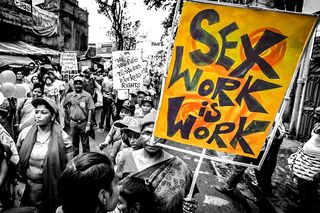
New Revision to Anti‑Trafficking Bill Doesn’t Account for Consensual Sex Work
There is a difference between consensual sex work and human trafficking – a nuance the bill ignores.

The Trafficking of Persons (Prevention, Protection and Rehabilitation) Bill, 2018, has been heavily criticized for want of nuance, in particular, because of the way in which it directly affects the sex work industry. The intention of the bill is to “make India a leader among South Asian countries to combat trafficking,” and has already been passed by the Lok Sabha. But while the Rajya Sabha will take up the issue during the winter session, the bill itself has come under tremendous scrutiny.
Sex work is legal in India – an achievement in itself – and judged only for being an offence against social mores, but soliciting in public spaces, and owning and managing brothels, remain criminal offenses. Experts at the UN are concerned that this new bill will place an emphasis on criminal responses to a broadly categorized “trafficking activities” which means that sex workers who are working legally may be thrown under the proverbial bus.
The bill aims to create harsher measures by way of criminal law, as well as a rescue-rehabilitation system. But critics point out a very basic flaw — legislation to curb trafficking is already in place. What is required now is effective and stringent implementation of the ITPA [Immoral Traffic Prevention Act] and Section 370, which already categorizes trafficking and forced prostitution as offenses punishable by imprisonment and fines.
*
Other critics feel the voices of those who want to abolish sex work entirely have colored the bill too much.
“Its focus on addressing trafficking from a criminal law perspective is not sufficiently complemented by a human rights-based and victim-centred approach,” the UN’s Special Rapporteur on trafficking in persons and the Special Rapporteur on contemporary forms of slavery said in a joint statement. They elaborated, saying that the inclusion of ‘rescue raids’ and programs would institutionalize victims in the name of rehabilitation.
In response, the Women and Child Development Ministryclarified its stance, stating that “At no point is the victim held as a criminal, or detained against his/ her will…” but because the bill blurs the lines between activities of trafficking and sex work, this is a doubtful claim.
Even if victims aren’t detained as criminals or against their will – and experts say that’s a big if — too often, non-trafficked, consensual sex workers are treated the same way.
In anextensive study conducted on how raid and rescue operations have impacted the lives of sex workers, Aarthi Pai, Meena Seshu, and Laxmi Murthy note that out of a sample of 243 women who were subject to raids, 79% (193 women) stated that at the time of the raids — some of which were conducted in a violent manner by police forces — they voluntarily engaged in sex work and that they did not want to be ‘rescued.’ Such women returned to sex work after their period of incarceration which spanned between one month to three years.
“The raid and rescue model ignores adult agency and ability of women to consent,” Aarthi Pai, Meena Seshu and Laxmi Murthy said. And yet, the surveillance-rescue-rehabilitation model forms the main thrust of this current bill.
*
Sex workers enter the trade owing to conditions which, although deplorable, do not involve outside force and deception, or trafficking. For many, sex work is merely their choice of an occupation in order to support families and gain economic independence. And since a large portion of the workforce in India is unskilled, the industry seems to provide a lucrative opportunity.
And this is the main problem with the bill, experts say: That it’s an attempt to regulate sex work through the lens of trafficking, rather than trafficking through the lens of sex work.
The sex trade industry is a complex world, traversing through questions of consent, compulsion, exploitation, coercion, and agency. There are risks to assuming exploitation and not considering pluralistic views when formulating legislation that affects the sector. Even though the bill has a direct impact on the lives of sex workers, the legislation has been drafted without discussions or consultations with sex workers.
“Sex workers are also stating that if the intention is to rescue victims of trafficking for sexual exploitation, then they are the strongest allies in this fight, since they are closest to the ground and are able to identify those bought into the trade against their will or are minors” Aarthi, Meena and Laxmi said. “Despite this, the Bill ignores the role of the sex workers in strengthening anti trafficking efforts.”
The Member of Parliament, therefore, ought to take another look at the Bill and hold consultations with the relevant stakeholders in order to consider subtleties which have been excluded. And while the list of critics of the Bill include Prabha Kotiswaran, Aarthi Pai, Meena Seshu and Laxmi Murthy, it is now up to the Rajya Sabha to decide its fate.
Rishika Pardikar is a freelance journalist from Bangalore, India.
Related


Ethiopia Appoints a Female President, and Fills Half Its Cabinet With Women
